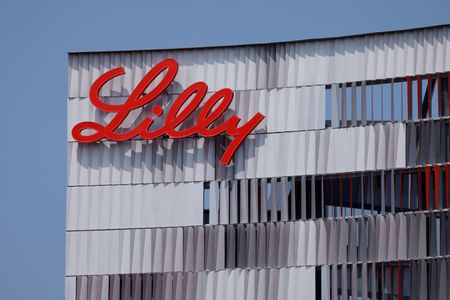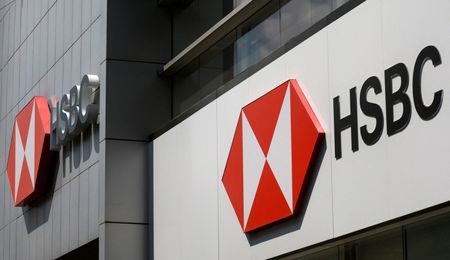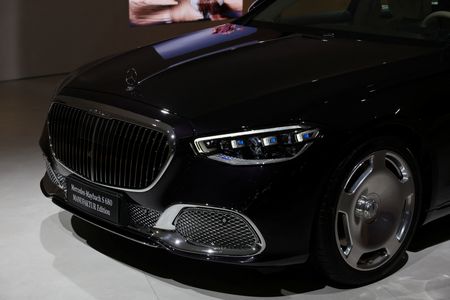By Patrick Wingrove and Bhanvi Satija
(Reuters) -Investors and analysts say they expect Eli Lilly to report stronger quarterly sales and profit next week than Danish rival Novo Nordisk did on Tuesday, and are anxiously awaiting a full-year outlook and updates on an experimental obesity drug to gauge the U.S. drugmaker’s longer-term health.
Lilly’s weight-loss drug Zepbound leads the U.S. market and has faced less competition from cheaper copies made by compounding pharmacies, giving it an edge, they said, after investors wiped $70 billion from Novo’s market value.
Novo, which sells the obesity drug Wegovy and related diabetes medicine Ozempic, on Tuesday issued a profit warning, citing lower U.S. growth expectations and competition including from compounded versions.
“I think that this is a pretty positive report for Lilly just because it shows the competitive note it has against their largest competitor,” said Dave Wagner, portfolio manager at Aptus Capital Advisors.
Analysts expect Lilly to post second-quarter earnings of $5.57 per share on revenue of $14.71 billion, according to LSEG data. They are also looking for a full-year profit of $21.83 per share.
Lilly has forecast adjusted earnings of $20.78 to $22.28 per share for 2025.
Still, Lilly’s shares fell nearly 5% on Tuesday, reflecting concern that the company could be vulnerable if Novo cuts prices aggressively or if its growth in the obesity market also slows more than expected, analysts and investors said.
Zepbound holds just under 60% of the obesity market, while Lilly’s diabetes drug Mounjaro – containing the same active ingredient – accounts for over half of its segment against Ozempic, according to IQVIA data shared with Reuters by an analyst. IQVIA did not immediately respond to a request for confirmation.
UBS analyst Trung Huynh said data also showed Lilly was getting around two-thirds of new patients onto Zepbound. The company in December posted results from a large head-to-head trial showing patients on Zepbound lost an average of 20.2% of their weight after 72 weeks compared to 13.7% for the group treated with Wegovy.
Lilly is also expected to be first to the market with the next generation of oral obesity drugs. Lilly has said it intends to seek approval for its experimental drug orforglipron by the end of the year.
Lilly has felt less heat from compounded versions of its medicines than Novo Nordisk, Huynh said, largely because Wegovy and Ozempic both hit the market before Lilly’s drugs and built up patient recognition sooner.
Compounding pharmacies earlier this year were restricted under U.S. law from making drugs that were essentially copies of Wegovy and Zepbound, but can still make personalized doses for patients who need them, or formulations not offered by FDA-approved medicines.
Investors earlier this year were rattled by CVS Health’s decision to drop Zepbound from some lists of medicines it covers for reimbursement starting on July 1, triggering a 10% share price plunge.
But Lilly’s stock has declined marginally so far this year, compared to a more than 40% fall in Novo Nordisk’s shares, including Tuesday’s moves.
Barclays analyst Emily Field said Lilly could calm investors next week by reaffirming or boosting revenue and profit outlooks, or simply by delivering strong financial results.
Brian Mulberry at Zacks Investment Management said signs of softness in the obesity or diabetes drug market, especially from a peer like Novo, typically trigger broad-based selling, which might account for Lilly’s share drop on Tuesday.
(Reporting by Patrick Wingrove in New York and Bhanvi Satija in Bengaluru; Editing by Caroline Humer and Bill Berkrot)










